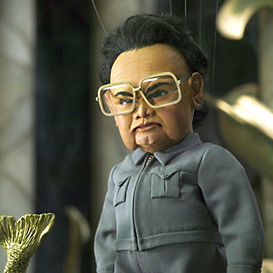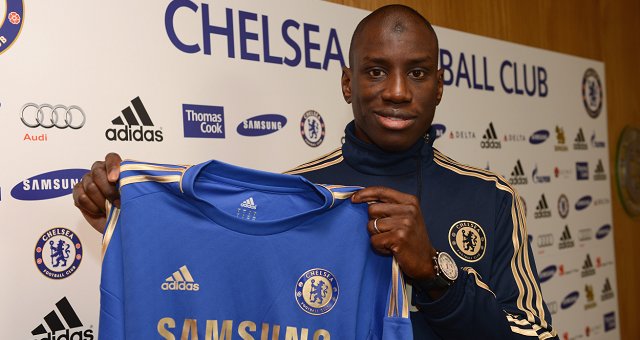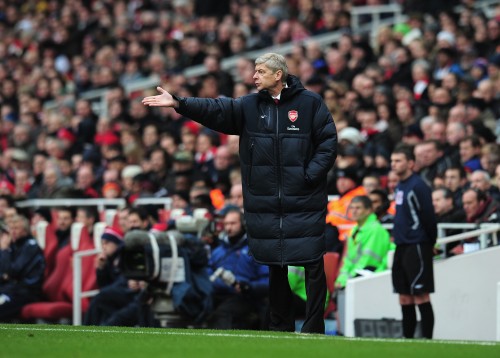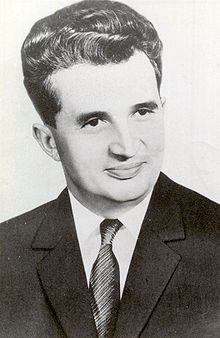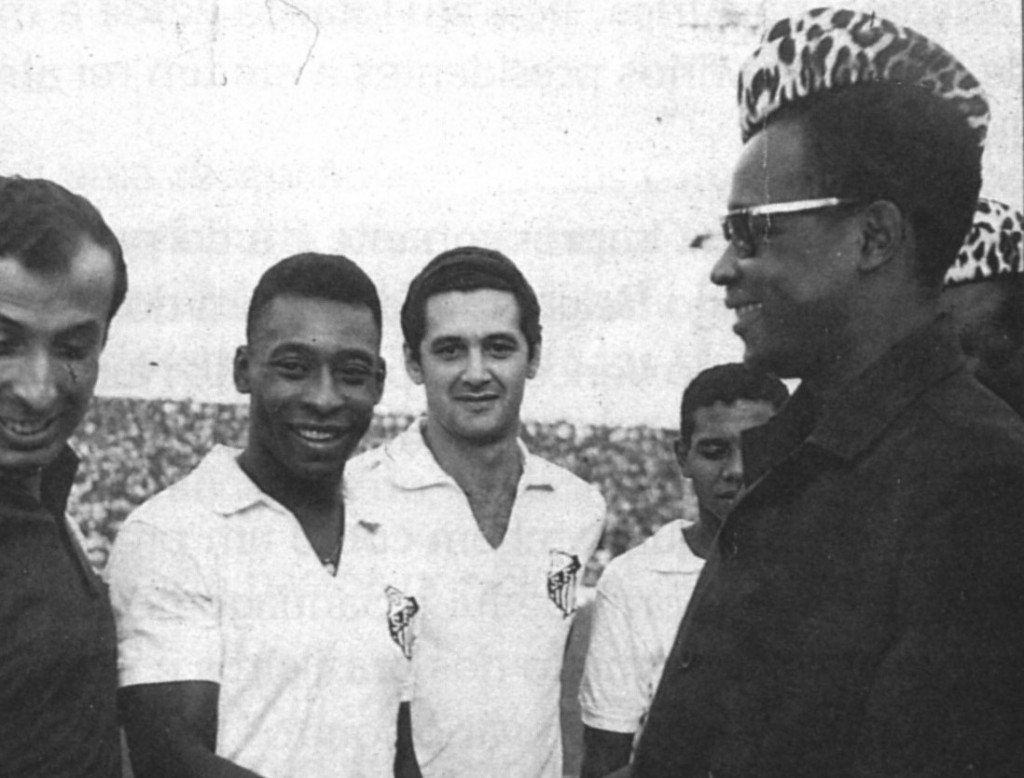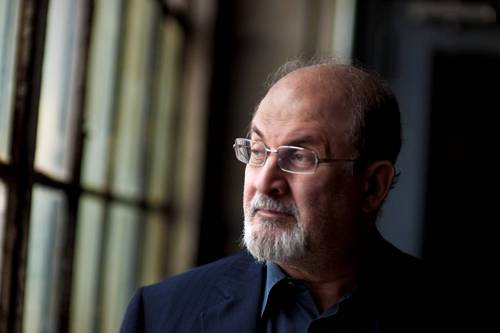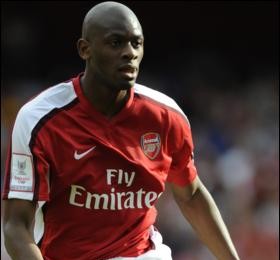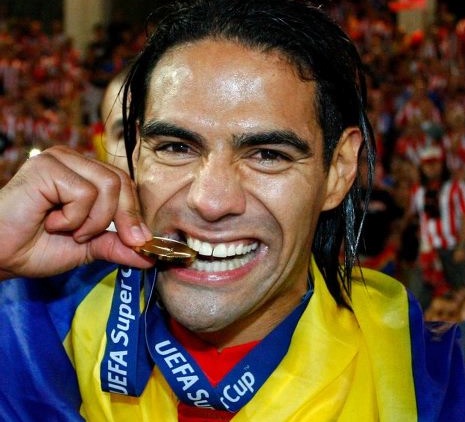[Editor’s note: This is the 3rd installment in the ongoing Dictators and Soccer series. See also the previous installments on Nicolae Ceaușescu of Romania and Mobutu Sésé Seko of Zaïre and later installments on Pope Benedict XVI of Vatican City and beyond.]
While some dictators qualify as relatively batshit crazy, North Korean Supreme Commander Kim Jong-il took run-of-the-mill guano and weaponized it with a deep, visceral nuclear fear factor. Against the backdrop of a starving nation, he enriched uranium, trained missiles on South Korea and Japan and generally gave everyone the heebie jeebies with the supremely iffy accuracy of the North Korean military’s test fires. To show another side—for, if nothing else, he was a well-rounded pot-bellied man—he then broadcast his eccentricities at back to back World Cups (his and hers, 2010 and 2011). Ultimately, this one-two proved too show stopping to top, so the tiny strongman took his bow and exited parts terrestrial for good in December 2011.
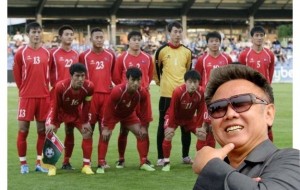 As two jumbo-sized phenomena in small form factors, Kim Jong-il and soccer were bound to collide, despite Kim Jong-il’s minimal interest in the sport (he preferred “mass games,” state-sponsored stadium displays of gymnastics and audience participation propaganda designed to praise all things Kim Jong-il; he also reportedly had video of nearly every game Michael Jordan ever played). The collision happened late in his totalitarian career, but collide they did.
As two jumbo-sized phenomena in small form factors, Kim Jong-il and soccer were bound to collide, despite Kim Jong-il’s minimal interest in the sport (he preferred “mass games,” state-sponsored stadium displays of gymnastics and audience participation propaganda designed to praise all things Kim Jong-il; he also reportedly had video of nearly every game Michael Jordan ever played). The collision happened late in his totalitarian career, but collide they did.
In 2010, North Korea qualified for the World Cup for only the second time, the first since 1966, at the dawn of dictatorship of his father and Soviet apparatchik predecessor Kim Il-sung. Then, a mere year later, the women’s team qualified for the 2011 Women’s World Cup. The notoriously insular, isolationist state had two high-profile football events in a row, choc-a-bloc jam-packed crammed-in tight. Kim Jong-il got ready for his close-up, the cameras zeroed in and the world watched to see what he’d do. He did not disappoint.
In the lead up to the World Cup, Kim Jong-il was known for so many things: the long-standing nuclear standoff with the world community, labor camps for any that incurred his chimerical wrath, his star-turning role as a surly puppet in Team America: World Police, his bouffant hairdo, his grandma sunglasses and the food shortages that crippled his country as he had sides of donkey and lobster airlifted to him traveling by train. Yet, for all his fame, so few knew about his tactical prowess in soccer.
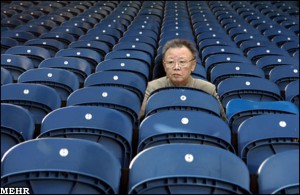 Before soccer blew up in the Dear Leader’s face—sorry to spoil the surprise—the sports community probably best knew Kim Jong-il for his renown as a crack golfer. According Pyongyang media in 1994, he shot 38 under par on a regulation 18-hole 7,700-yard golf course, featuring between 5 and 11 holes in one (reports vary). It was his first ever round of golf. Then, tearing himself away from his reported thousands of hours of Michael Jordan footage (intermixed with the world’s allegedly largest collection of porn), he bowled a perfect 300 his first go at Pyongyang Lanes, again according to state media. The platform-shoed leader clearly possessed uncommon athletic genius. Most likely, he also could destroy anyone domestically at competitive eating, but then he was one of the only people in the country with food, so it may have seemed in bad taste to flaunt that particular feat of physical excellence. After all, North Korea had initiated a “Let’s Eat Two Meals a Day” campaign, which many would happily have done, given the choice, as it wouldn’t have been revising downward so much as upward.
Before soccer blew up in the Dear Leader’s face—sorry to spoil the surprise—the sports community probably best knew Kim Jong-il for his renown as a crack golfer. According Pyongyang media in 1994, he shot 38 under par on a regulation 18-hole 7,700-yard golf course, featuring between 5 and 11 holes in one (reports vary). It was his first ever round of golf. Then, tearing himself away from his reported thousands of hours of Michael Jordan footage (intermixed with the world’s allegedly largest collection of porn), he bowled a perfect 300 his first go at Pyongyang Lanes, again according to state media. The platform-shoed leader clearly possessed uncommon athletic genius. Most likely, he also could destroy anyone domestically at competitive eating, but then he was one of the only people in the country with food, so it may have seemed in bad taste to flaunt that particular feat of physical excellence. After all, North Korea had initiated a “Let’s Eat Two Meals a Day” campaign, which many would happily have done, given the choice, as it wouldn’t have been revising downward so much as upward.
After North Korea qualified for the World Cup in South Africa, Zimbabwean dictator Robert Mugabe got the circus started. In March 2010, Mugabe sent a celebratory if unorthodox World Cup qualification gift: an ark populated with pairs of giraffes, baby elephants, warthogs, zebras and other animals the Bible considers essential to post-diluvian life. Cue wildlife conservation group hysteria. Cue also a personal invitation from Mugabe for training ground hospitality in Zimbabwe, northern neighbor of the tournament host. Kim Jong-il graciously accepted the kind offer, very possibly for the allure of more game meat. The two dictatorships go way back, most formatively between North Korea’s care packages of guns and military aid during Mugabe’s post-revolution massacres of the Matabele tribe (20,000 dead) in the early 1980s. Training grounds just a hop from the host country, acclimation without the riffraff, nestled in the lap of troubled-nation luxury, feast amidst famine just like home. It all added up to good times and minimal culture shock.
Then, the North Korean national coach spilled the beans on the secret behind the team’s success. North Korean manager Kim Jong-hun reportedly got his coaching mandates straight from the man himself by means of an invisible headset that the Dear Leader had invented. According to Radio Free Asia, the coach received “regular tactical advice during matches” from Kim Jong-il “using mobile phones that are not visible to the naked eye.” Now that’s innovation. Of course, it’s not like he hadn’t invented impressive things before. North Korean history books proclaim that Kim Jong-Il invented the hamburger in 2000. He named it Double Bread with Meat.
After the invisible headset comments, journalists naturally peppered the North Korean manager with a barrage of questions, but he shut down into No Comment mode, especially after the additional fiasco of trying to sneak an extra striker into the squad. At some point, FIFA had noticed that of the three goalkeepers named in the 23-man squad, one had never actually ever goalkept. Rather, he was one of the country’s best strikers, and FIFA ejected him from the team. North Korea had tried to sneak an extra goalscorer into their team but ultimately went a player down. Chalk up an own goal to North Korea.
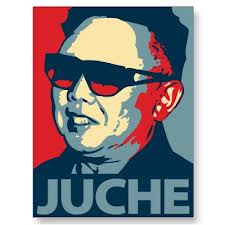 The tactical soccer genius had many personae. Perhaps you know Kim Jong-il by one of his many descriptive titles, such as Dear Leader, Who Is a Perfect Incarnation of the Appearance That a Leader Should Have. (This of a jump-suited pudgy anti-fashion plate who gravitated to platform shoes and a thinning bouffant befitting a character on Golden Girls.) Perhaps one of his cosmological honorifics has caught your ear: Sun of Socialism, Sun of the Nation, Sun of the Communist Future, Bright Sun of Juche (Self-Reliance), Bright Sun of the 21st Century, Guiding Sun Ray, Shining Star of Paektu Mountain, Guiding Star of the 21st Century. No? Perhaps one more military-minded: Glorious General, Who Descended From Heaven; Highest Incarnation of the Revolutionary Comradely Love; Beloved and Respected General; Peerless Leader; Invincible and Ever-Triumphant General. Kim Jong-il had split personalities in spades, all of which were eccentric and several that were deadly. You really didn’t want to see him angry. Cross him and he’d take that world-famous comradely love and Hulkslam you onto a pile of concentration camp bones.
The tactical soccer genius had many personae. Perhaps you know Kim Jong-il by one of his many descriptive titles, such as Dear Leader, Who Is a Perfect Incarnation of the Appearance That a Leader Should Have. (This of a jump-suited pudgy anti-fashion plate who gravitated to platform shoes and a thinning bouffant befitting a character on Golden Girls.) Perhaps one of his cosmological honorifics has caught your ear: Sun of Socialism, Sun of the Nation, Sun of the Communist Future, Bright Sun of Juche (Self-Reliance), Bright Sun of the 21st Century, Guiding Sun Ray, Shining Star of Paektu Mountain, Guiding Star of the 21st Century. No? Perhaps one more military-minded: Glorious General, Who Descended From Heaven; Highest Incarnation of the Revolutionary Comradely Love; Beloved and Respected General; Peerless Leader; Invincible and Ever-Triumphant General. Kim Jong-il had split personalities in spades, all of which were eccentric and several that were deadly. You really didn’t want to see him angry. Cross him and he’d take that world-famous comradely love and Hulkslam you onto a pile of concentration camp bones.
Born in a log cabin on North Korea’s tallest peak, the heavens heralded Kim Jong-il’s coming with the call of a sparrow, a double rainbow and a new, incomparably bright star in the skies. As the son of a dictator, let alone Sun of just about everything, the man’s destiny saw writ the country in the palm of his grubby little hands. Kim Jong-Il had dynasty on his side. Add a cult of personality in overdrive and the image of the permed Peerless Leader beaming forth from every North Korean corner, with his trademark demeanor of divine, slightly ill-tempered apathy. Rays of light streamed from behind and silhouetted him in classic Brother Communist shock and awe.
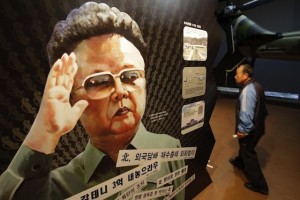 North Koreans were told their leader was vastly famous and revered worldwide. He didn’t heap those just-mentioned honorifics titles on himself, his admirers clamored to bestow them, both domestically and abroad. He simply accepted them with humility. Citizen comrades learned all this and more from the solitary state-run TV channel feeding a steady stream of Kim Jong-il praise clips and purported quotes and accolades from other world leaders about the Dear Leader. Newscasters had to recite them via TelePrompTer, as no video seemed available.
North Koreans were told their leader was vastly famous and revered worldwide. He didn’t heap those just-mentioned honorifics titles on himself, his admirers clamored to bestow them, both domestically and abroad. He simply accepted them with humility. Citizen comrades learned all this and more from the solitary state-run TV channel feeding a steady stream of Kim Jong-il praise clips and purported quotes and accolades from other world leaders about the Dear Leader. Newscasters had to recite them via TelePrompTer, as no video seemed available.
Then came the 2010 World Cup, for which Kim Jong-il had banned any live broadcast of the country’s matches. For its group stage, North Korea had gotten the worst draw possible: they faced Brazil, Portugal and the Ivory Coast in the proverbial Group of Death. Portugal had reached the semifinals in both the 2006 World Cup and the 2008 Euros, Brazil had won the tournament a record five times, and the power-packed Ivory Coast squad represented the foremost hope of an African team winning on African soil. The North Korean dictator didn’t want to open himself up to embarrassment, and with good reason.
However, after a respectable 2-1 loss to Brazil in the opening match, in a moment of glorious optimism, Kim relaxed the restrictions and allowed broadcast of the next match against Portugal, the first sports event ever broadcast live in the country. Cristiano Ronaldo & Co. slaughtered the team 7-0. The state recoiled from the blow by reflexive ceasing of all further broadcasts to stanch the blood flow, although the damage had been done. North Koreans merely missed seeing the subsequent 3-0 loss to the Ivory Coast.
In addition to the scoreline, North Koreans may have puzzled at the North Korean rent-a-fans pictured in the stands at the 2010 World Cup. The “North Koreans” were Chinese actors paid to attend the North Korea games in South Africa. FIFA had granted North Korea 17,000 tickets for the matches, but actual North Koreans posed far too obvious a defection flight risk, so Kim hired Chinese extras to represent by proxy with their best North Korean impressions. The roles of their careers, right there on the world stage. Too bad they sucked at acting, and as a result the news spread like tabloid wildfire. In addition to all the goals scored by Brazil, Portugal and the Ivory Coast, North Korea scored another great big own goal on itself.
All together, North Korea conceded the most goals of the tournament, though their total of 12 failed to equal the conceded goal tally of Zaire’s 1974 squad (14). Like the 1974 Zaire squad, however, there was hell to pay upon reentry home. Summoned to Pyongyang and placed on a stage of shame at the People’s Palace of Culture, the squad got pummeled by a torrent of glares, disappointment and betrayed looks, pilloried by 400 students, government lackeys and others for six hours, charged with “betraying the trust of Kim Jong-un.” (Kim Jong-il, heartbreakingly paternal, taught by example and perfectly demonstrated the art of passing the buck to his heir.) A wounded look from Jong-Il hurt more than 1000 deaths, went the rationale. After phase one of the public scolding, each of the players was ordered to reprimand the coach individually in turn. The state then reportedly sentenced Kim Jong-hun to hard labor for the team’s failings. It’s not certain that any nonverbal torture transpired after the theatrically staged rebuke and the inconsolable disappointment of the Kims, but neither can anyone entirely rule it out. No word on whether Kim Jong-il ventriloquized any scathing remarks via invisible headset.
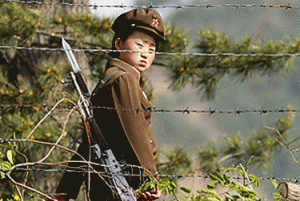 Going into the tournament, players had received the bounty of Kim’s affection in the form of new apartments, refrigerators, cars, and televisions. Not much use if you’re sent to the coal mines upon return, but there you have it. (Carrot, meet stick.) Of course, many North Koreans minding their own business go to the coal mines on the daily, anyway.
Going into the tournament, players had received the bounty of Kim’s affection in the form of new apartments, refrigerators, cars, and televisions. Not much use if you’re sent to the coal mines upon return, but there you have it. (Carrot, meet stick.) Of course, many North Koreans minding their own business go to the coal mines on the daily, anyway.
The men’s team was not the only World Cup team to let Kim Jong-il down in that 12-month span. In the Women’s World Cup in the summer of 2011, after the North Koreans lost 2-0 to the U.S.—bad enough given the country’s geopolitical stance—five of their athletes tested positive for suspicious levels of testosterone. North Korea swiftly trotted out a perfectly reasonable explanation. The coach explained that a large portion of the squad had recently been struck by lightning, which would throw off anyone’s game. Using the time-honored traditional lightning-strike cure of deer musk gland, medics nursed the women back to health. Far from being cheats, these women had exhibited just the sort of self-reliance (or juche) that the state always drilled into them, with a healthy side of deer testosterone. Lightning clearly explained everything.
Kim Jong-il naturally excelled at golf, bowling, competitive eating and soccer tactics, but perhaps the feat of strength Kim Jong-il mastered most was the totalitarian stranglehold. Propaganda tightened his grip over the people and perpetually indoctrinated the hapless, hungry masses in a feedback loop. The state employed propaganda as varied as it was pervasive: marches, rallies, parades, textbooks, airbrushed photographs, statues, murals, billboards, posters, signs, state-run print and TV media reports, speeches, gun-in-the-back endorsements—you name it. 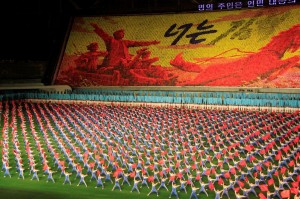 At the arena where the national soccer team played, up to 20,000 schoolchildren in the mass games would collectively present huge stadiumwide depictions of Kim Jong-il and Kim Il-sung as thousands more enacted contortionist gymnastics on the field. The oversize pixel-picture books they held aloft contained approximately 170 pages, so that in an instant they could all flip to a specified page in tandem and display yet another victorious image of the Dear Leader. Such books may strike one as a bit heavy for schoolchildren eking by on two meals a day, but again, there you have it.
At the arena where the national soccer team played, up to 20,000 schoolchildren in the mass games would collectively present huge stadiumwide depictions of Kim Jong-il and Kim Il-sung as thousands more enacted contortionist gymnastics on the field. The oversize pixel-picture books they held aloft contained approximately 170 pages, so that in an instant they could all flip to a specified page in tandem and display yet another victorious image of the Dear Leader. Such books may strike one as a bit heavy for schoolchildren eking by on two meals a day, but again, there you have it.
According to Kim, however, no food shortages existed. He should know, he lived there. In his universe, Kim said “Do as I say” without bothering with “or else.” One didn’t brook dissent. Nor did one mention Let’s Eat Two Meals a Day unless he did first. He made his fictitious North Korea real by simply refusing to countenance any other reality. To speak of any other reality meant detention, labor camps or execution. According to Amnesty International, approximately 200,000 prisoners in North Korean concentration camps perform 12-hour shifts of forced labor under the eye of guards who see beatings, torture and execution as the three levels of disciplinary action, three legs of a stool, all essential. Even relatives of convicts were sometimes imprisoned, due to Kim Jong-il’s belief that a propensity to criminality persists for three generations.
Incidentally, according to Kim Jong-il, no labor camps existed. Meanwhile, prisoners at the camps memorized and sang Kim Jong-il praise songs while working. They got soundly beaten if they didn’t sing loud enough or took overly long pauses.
Another crime worthy of corporal punishment: calling the country North Korea. The Democratic People’s Republic of Korea represented the only Korea, full stop. Nothing lay to the south, unless one day Kim Jong-il managed to annex it. When South Korea held the World Cup in 2002, he rebuffed all offers to host a match and banned all broadcast of the event in his country, though he did not turn away food aid, as long as it arrived unpublicized. South Korea, with China, remains one of the largest donors of food aid, so the imaginary land beyond known borders served Kim Jong-il’s purposes. He conjured food out of thin air, like a giant rabbit out of a magician’s hat. (This is foreshadowing.)
Amnesty International estimates that nearly 1 million North Koreans have died of starvation since the mid-1990s, when the food shortages and Kim Jong-il’s reign (of terror) began. With regard to the concentration camps, Amnesty International has speculated on a 40 percent yearly death rate between 1999 and 2001, with malnutrition and starvation two primary factors. Extrapolating to the present, 80,000 political prisoners die per year in the camps. Accounting for possibly inflated figures, even a fraction of that number astounds.
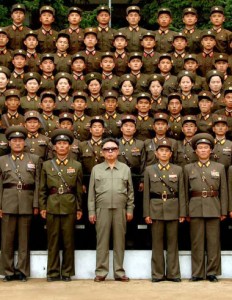 Food shortages arose in part from the collapse of the Soviet Union in 1991, from which North Korea received chemical fertilizer and other crucial aid. Once the stream from its Soviet benefactor dried up, agricultural mismanagement, food-delivery shutdowns from fuel shortages and serious flooding in 1995 combined to result in a reported 3 million dead from famine. Which one could argue was not Kim Jong-il’s fault, except when factoring in a military budget of $6 billion.
Food shortages arose in part from the collapse of the Soviet Union in 1991, from which North Korea received chemical fertilizer and other crucial aid. Once the stream from its Soviet benefactor dried up, agricultural mismanagement, food-delivery shutdowns from fuel shortages and serious flooding in 1995 combined to result in a reported 3 million dead from famine. Which one could argue was not Kim Jong-il’s fault, except when factoring in a military budget of $6 billion.
North Korea has the fourth largest military in the world, the Korea People’s Army. In a nation of less than 5 million men “fit for military service” (ages 17-49), North Korea fielded 1,106,000 armed personnel in a 2010 estimate. Largely attributable to the mandatory 10-year military service, that’s over 20%, a staggering percentage. In a country ravaged by famine and undernutrition, perhaps it also represented one of the safest bets for three square meals.
Meanwhile, the numbers quoted for his yearly bill for Hennessy cognac added up to astronomical sums—an estimated $650,000 to $800,000 annually, depending on the source, going back to the ’90s. Half gallons of Hennessy bestseller VS go for $65, so that amounts to a lot of booze, and at 5’2, one wouldn’t expect him capable of downing all that much by himself. Yet neither does he seem like the kind of guy who throws a party and exhorts all his guests to “Drink! Drink!” Perhaps he bathed in it, or cognac formed some part of the North Korean uranium enrichment program.
The U.S. went so far as to issue an embargo on luxury goods to North Korea to get to one man. Aside from Hennessy, the embargo theoretically deprived Kim Jong-il of favorites such as culinary delicacies and other goodies one might find in a duty-free shop. However, since he headed an exporting nation of arms and nuclear secrets, it’s unlikely Kim Jong-il encountered much difficulty acquiring any goods he wanted on the black market. The man had roast donkey and lobster regularly airlifted to him when he traveled by train to China, Russia, or wherever. (He had a fear of flying.) Kim Jong-il also had his personal chef personally fetch caviar from Iran and Uzbekistan, pork from Denmark and mugwort-scented rice cakes from a Tokyo department store. Until the personal chef defected on a sea urchin run to Japan, that is–a truly sad day for the Dear Leader.
 Despite splurging on Hennessy and many and varied culinary whims, it’s not like Kim Jong-il didn’t try to solve the food shortages that didn’t exist. Yes, he pocketed foreign aid earmarked to feed his starving countrymen, but he also had a genius brainstorm one day: mutant-like giant rabbits.
Despite splurging on Hennessy and many and varied culinary whims, it’s not like Kim Jong-il didn’t try to solve the food shortages that didn’t exist. Yes, he pocketed foreign aid earmarked to feed his starving countrymen, but he also had a genius brainstorm one day: mutant-like giant rabbits.
In 2006, Kim Jong-il learned of a man named Karl Szmolinsky in Germany who bred giant rabbits. The Dear Leader saw pictures of the abnormally huge bunnies, found them delightfully appealing and deemed giant rabbit meat the key to solving North Korea’s food problems, or lack thereof. He ordered 12 rabbits and told Szmolinsky he planned to keep the rabbits at a petting zoo in Pyongyang, with a long-range plan of setting up a breeding farm. He offered to fly Szmolinsky over, but quickly reversed and rescinded the offer. After learning the rabbits cost upwards of $115 apiece, he despaired of solving the problem and just ate them himself.
 Giant rabbits predictably return the discussion back to soccer tactics. Perhaps he could have fielded a team of ultra-technical springy-stepped giant rabbits. If anyone were to try, it would have been Kim Jong-il. Two problems, though. One, they had long since gone down the hatch, and two, FIFA had deemed the World Cup human-only, just as they had refused to allow fake goalkeepers to be strikers. Kim might have considered keeping the giant rabbits around for sport, whether rabbit races or rabbit polo, with those giant lucky feet. Instead, they passed through his digestive tract. (One consequently wonders what became of all the zebras, warthogs and giraffes from Mugabe’s ark.) So ultimately the rabbits did not put a dent in the nation’s food shortage problems, though their flesh did temporarily quell the hunger of one man, a man who, in fairness, did embody the nation, according to propaganda.
Giant rabbits predictably return the discussion back to soccer tactics. Perhaps he could have fielded a team of ultra-technical springy-stepped giant rabbits. If anyone were to try, it would have been Kim Jong-il. Two problems, though. One, they had long since gone down the hatch, and two, FIFA had deemed the World Cup human-only, just as they had refused to allow fake goalkeepers to be strikers. Kim might have considered keeping the giant rabbits around for sport, whether rabbit races or rabbit polo, with those giant lucky feet. Instead, they passed through his digestive tract. (One consequently wonders what became of all the zebras, warthogs and giraffes from Mugabe’s ark.) So ultimately the rabbits did not put a dent in the nation’s food shortage problems, though their flesh did temporarily quell the hunger of one man, a man who, in fairness, did embody the nation, according to propaganda.
Kim Jong-il was an erratic character, but the man knew how to manipulate. He orchestrated never-before-seen feats of unpredictability in the art of brinksmanship, as shown by all the ever-ongoing talks about unilateral/multi-lateral talks about North Korea’s nuclear weapons program. In the arena of international soccer, however, he landed flat on his face. Everyone agrees that when you score a goal on yourself, it’s called an own goal. No precise term exists for 12 goals in the back of the wrong net. Dodeca-catastro-own goal will have to suffice.
North Korea is reclusive in the extreme, but Kim Jong-il certainly knew how success in the World Cup could amplify his cult of personality domestically. But like so many other dictators before him, he probably dreamed of how international soccer success might help on a broader international level. Move higher in the estimation of trader nations, at the very least, or get one over on the Japanese or South Korea, which would work perfectly for a tapeloop sound bite. Unfortunately for him, he hadn’t done his homework on how potent soccer can often be in backfiring in a dictator’s face. (See Dictators and Soccer: Mobutu Sésé Seko and Zaire.)
Soccer represented little more than a tangential curiosity to Kim Jong-il. His dangerous megalomania simply spread in every direction. Sports, and therefore soccer, just got sucked into the tractor beam along with everything else, as had other entertainment forms before, such as when in 1978 Kim Jong-il had South Korean filmmaker Shin Sang-ok and his leading actress wife kidnapped and held captive for 8 years, forcing the couple to produce propaganda movies, including Godzilla ripoff Pulgasari, considered a cult classic of B-movie awfulness.
Kim Jong-Il stabbed the Ministry of Culture with a ballpoint pen and spat at the screen when he saw himself parodied in the James Bond film Die Another Day. One does not know if he saw Team America or what poor sap got stuck with what office supplies that time. Kim with a stapler gun strikes one as a scary proposition. With putative superhuman strength like his, he could easily pile drive a minister onto a fax machine. He may have seen and drawn inspiration from the printer beatdown scene in Office Space, noted cinephile that he was.
What was the Jong-illian reaction to Team America: World Police and a parody-puppet Kim’s turn as a surly bulldog-jowled yet deep down just “ronery” puppet bent on world domination? More importantly, what would have been his new tactical approach for the 2014 World Cup in Brazil? We just don’t know. Logic suggests someone got stabbed with something and a few teams would have been stabbed, respectively. Perhaps in the post-Jong-un era, the answers to burning questions such as these and more will finally emerge.
Extra Special Kim Sung-il and Soccer Bonus:
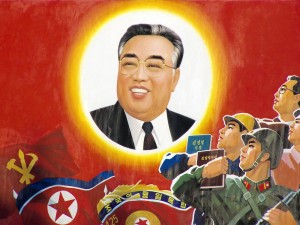 For some historical perspective, the North Korea team of 1966 thrilled the nation. As one of the only all-Asian teams in the competition, as opposed to those limping out of colonialism, they had a successful tournament, showcasing the kind of prestige befitting Eternal Leader Kim Il-sung and his heir, the future Dear Leader. Kim Il-Sung proudly sent out his soldier athletes to the field of battle, their first ever involvement in the tournament in the promising years after the Korean War.
For some historical perspective, the North Korea team of 1966 thrilled the nation. As one of the only all-Asian teams in the competition, as opposed to those limping out of colonialism, they had a successful tournament, showcasing the kind of prestige befitting Eternal Leader Kim Il-sung and his heir, the future Dear Leader. Kim Il-Sung proudly sent out his soldier athletes to the field of battle, their first ever involvement in the tournament in the promising years after the Korean War.
North Korea lost 3-0 in the first match to the USSR, probably a wise move since the country could not survive financially without the backing of the big Soviet bear. A 1-1 draw with Chile followed. Time to step it up for the third match, the last chance to qualify for the knockout stages, except the opponent was Italy, the pre-tournament favorites. Stunning the Italians, North Korea beat the team 1-0 in the final match of the group stages, sending the Italians packing and themselves into the quarterfinals. Pandemonium ensued. They were through, the first Asian team to make the knockouts. They beat the world giants and solidly announced the newish nation to the world. They were there to win it, to honor the sovereignty and divinity of Kim Il-sung.
All this from a team for whom the English FA officials refused to play the national anthem, in protest of the regime. Oddly, the incident was partially relived 46 years later in England, as well, albeit unintentionally and flag swapped for anthem in the 21st-century rendition. At the 2012 London Olympics, when introducing the North Korean women’s team, the video screen projected the South Korean rather than the North Korean flag, a gaffe made worse when organizers apologized to “North Korea,” which doesn’t recognize itself as North anything, prompting the organizers to release yet another apology, this time directed to the “Democratic People’s Republic of Korea,” as the country self-identifies.
Returning to 1966, however, North Korea faced another dictatorship nation in the quarterfinals, Portugal under the rule of António de Oliveira Salazar. The team featured one of the standout talents of the team and the generation, a Mozambique-born gentleman named Eusébio da Silva Ferreira, also known simply as Eusébio or “The Black Panther.”
In the knockout match against Portugal, the North Koreans were even 3-0 up at one point, before superstriker Eusébio scored four straight and Portugal emerged victorious with a 5-3 scoreline. Although England beat Portugal in the semifinals and triumphed over West Germany in the final, Eusébio won the Golden Boot, finishing the tournament as the highest goal scorer. However, the Black Panther had performed so well that Salazar refused to allow him the leave the country for a big-money offer at Inter Milan. Scoring 638 goals in 614 matches for Benfica may have granted him some solace.
Kim Il-sung’s North Korea was even more secretive than the current-day incarnation, so it’s unclear what became of the 1966 heroes. Rumors circulated that upon their return the players were imprisoned for their hedonistic Western-style partying. Those familiar with the labor camps and torture activity in North Korea find this plausible, though there’s no definitive proof. Safest bet: players and coach were sentenced to labor camps, torture optional, depending on whether they tried to escape. Perhaps they were subjected to a nonstop recording of the national anthem, or conversely were deprived of the privilege. (Current-day striker Jong Tae-Se, the “North Korean Rooney,” weeps copious tears of joy whenever the national anthem is played, like an obedient if a bit obsequious comrade. Or maybe he weeps tears of non-joy—hard to say.)
The scrappy team of ‘66 wasn’t called upon for the soccer field again, at any rate. When the government refused to play Israel in the qualifying rounds for the 1970 World Cup, the team was disqualified and the world had to go nearly a half-century without the soccer stylings of North Korea until the looney-tunes antics of Kim Il-sung’s son, a man the likes of whom we may (hopefully) never see in power again.
Dictators and Soccer/Football:
Mobutu Sésé Seko (Zaïre)
Nicolae Ceaușescu (Romania)
Kim Jong-il (North Korea)
Pope Benedict XVI (Vatican City)
https://twitter.com/tyrannosoccer
https://www.facebook.com/DictatorsAndSoccer
Copyright © 2013

